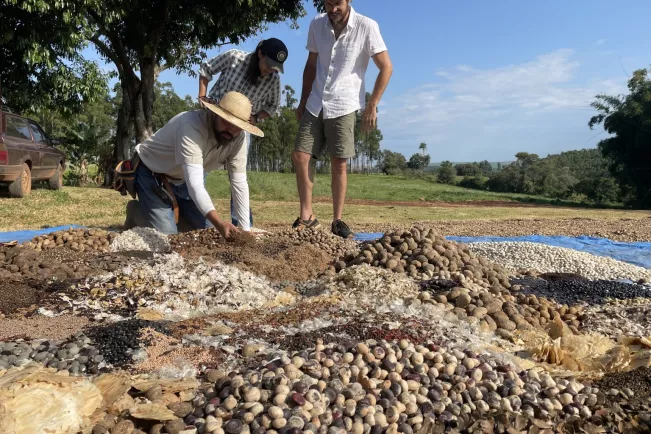International Centre for Sustainable Development (IZNE)
Binding carbon with rock powder: Former PHD student leads research in an innovative company

„Our greatest goal is to regenerate tropical soils sustainably while sequestering CO2 over the long term.”
Dr. Philipp Swoboda, Former PHD at H-BRS (IZNE)
Over the course of Earth's history, most atmospheric carbon dioxide has been removed by the weathering of silicate rocks. Silicate rocks are the most common rocks in the Earth's crust. They react with water and CO2 to form dissolved bicarbonates. These are eventually washed by rivers into the oceans, where they form carbon-rich sediments (sedimentary or layered rocks).
The "InPlanet" team is accelerating this natural carbon decomposition by applying rock flour to agricultural land in the tropics because that's where the weathering potential is highest. In addition to the ability to sequester carbon, the increased weathering regenerates tropical soils and serves to fertilize crops. This also allows farmers to reduce the use of limestone, synthetic fertilizers and pesticides. In this way, the company's projects contribute not only to CO2 sequestration but also to more sustainable agriculture.
Philipp Swoboda already conducted research on the use of rock flour in his doctoral thesis at the H-BRS, supervised by Prof. Martin Hamer. Under the name "Turning rocks to bread? Agricultural application of rock dust in the context of One Health", his work was interdisciplinary at the interface between geology, soil science and agricultural sciences. Swoboda is now research lead at "InPlanet".
"We are always looking for suitable cooperation partners, especially in the state of Sao Paulo," says Philipp Swoboda. Currently, "InPlanet" is starting the field trials, as well as the installation of outdoor mesocosm (outdoor experimentation systems) and greenhouse experiments. Local mines and farmers are continuously involved in this process.
„Our greatest goal is to regenerate tropical soils sustainably while sequestering CO2 over the long term.”
Dr. Philipp Swoboda, Former PHD at H-BRS (IZNE)
Over the course of Earth's history, most atmospheric carbon dioxide has been removed by the weathering of silicate rocks. Silicate rocks are the most common rocks in the Earth's crust. They react with water and CO2 to form dissolved bicarbonates. These are eventually washed by rivers into the oceans, where they form carbon-rich sediments (sedimentary or layered rocks).
The "InPlanet" team is accelerating this natural carbon decomposition by applying rock flour to agricultural land in the tropics because that's where the weathering potential is highest. In addition to the ability to sequester carbon, the increased weathering regenerates tropical soils and serves to fertilize crops. This also allows farmers to reduce the use of limestone, synthetic fertilizers and pesticides. In this way, the company's projects contribute not only to CO2 sequestration but also to more sustainable agriculture.
Philipp Swoboda already conducted research on the use of rock flour in his doctoral thesis at the H-BRS, supervised by Prof. Martin Hamer. Under the name "Turning rocks to bread? Agricultural application of rock dust in the context of One Health", his work was interdisciplinary at the interface between geology, soil science and agricultural sciences. Swoboda is now research lead at "InPlanet".
"We are always looking for suitable cooperation partners, especially in the state of Sao Paulo," says Philipp Swoboda. Currently, "InPlanet" is starting the field trials, as well as the installation of outdoor mesocosm (outdoor experimentation systems) and greenhouse experiments. Local mines and farmers are continuously involved in this process.
Contact points
Kontakt: Internationales Zentrum für Nachhaltige Entwicklung (IZNE)
Campus
Sankt Augustin